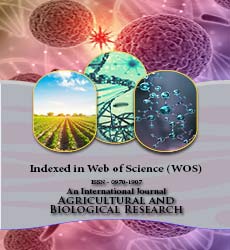Agricultural and Biological Research
RNI # 24/103/2012-R1
Sarita* and Sunil Kumar
Soil-borne diseases pose significant threats to crop yields and agricultural economies worldwide. Consequently, effective crop protection strategies are vital for sustaining agricultural productivity. Historically, the reliance on chemical fungicides has been prevalent to enhance crop yields. However, the indiscriminate use of these chemicals has led to detrimental effects on the environment, human health and overall ecosystem balance by unintentionally harming non-target organisms. In response to these challenges, alternative approaches have gained traction in recent years for managing soil-borne diseases. Among these alternatives, biocontrol emerges as a promising eco-friendly solution, mitigating the risks associated with chemical residues on human health and the environment. Biocontrol Agents (BCAs) offer a less toxic and more flexible alternative to chemical pesticides. These agents exert their effects through various mechanisms, including antibiosis, competition for resources, parasitism and the Induction of Systemic Resistance (ISR). Bacteria such as Bacillus spp., Pseudomonas spp. and fungi like Trichoderma spp. are widely recognized as effective bio-control agents against soilborne diseases. Notably, bacteria such as Bacillus spp. and Agrobacterium radiobacter thrive in soil and the rhizosphere, making them particularly suitable for agricultural applications. This review emphasizes the intricate interactions among soil-borne pathogens, their natural antagonists, plants and the environment, with a focus on fostering sustainable agricultural practices. However, successful implementation of biocontrol strategies requires appropriate management approaches tailored to specific agricultural ecosystems, ensuring their efficacy and sustainability in the long term.
